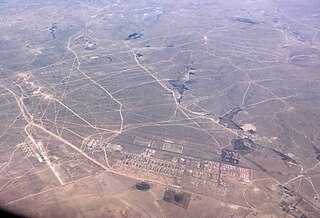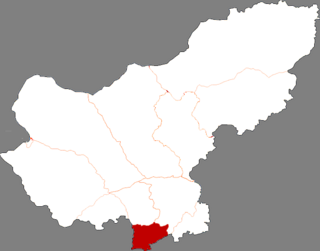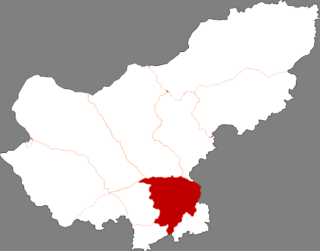
Shangdu, also known as Xanadu, was the summer capital of the Yuan dynasty of China before Kublai decided to move his throne to the former Jin dynasty capital of Zhōngdū which was renamed Khanbaliq. Shangdu is located in the present-day Zhenglan Banner, Inner Mongolia. In June 2012, it was made a World Heritage Site for its historical importance and for the unique blending of Mongolian and Chinese culture.

Ulanqab or Ulan Chab is a region administered as a prefecture-level city in south-central Inner Mongolia, China. Its administrative centre is in Jining District, which was formerly a county-level city. It was established as a prefecture-level city on 1 December 2003, formed from the former Ulanqab League.
Xilinhot is a county-level city which serves as the seat of government for the Xilin Gol league in Inner Mongolia, People's Republic of China. It has a jurisdiction area of 14,785 km2 (5,709 sq mi) and a population of 245,886; 149,000 people live in the Xilinhot urban area.
Dolon Nor, is a town and the county seat of Duolun County, Xilin Gol League in the Inner Mongolia Autonomous region, China. It is of historical importance because the remnants of Shangdu, the summer capital of Kublai Khan and the following Mongol emperors of the Yuan dynasty, are located some 28 kilometers northwest of the modern town. Beginning in the 17th century, the Manchu emperors of the Qing dynasty developed the city as a religious center.

Xilingol League is one of the 3 leagues of Inner Mongolia. The seat is Xilinhot, and the area is 202,580 km2 (78,220 sq mi). The league's economy is based on mining and agriculture.
Hongor or Khongor is a frequent compound of toponymics both in Mongolia and in Inner Mongolia, China, for example:
The Üzemchin, also written Ujumchin, Ujumucin or Ujimqin, are a subgroup of Mongols in eastern Mongolia and Inner Mongolia. They settle mainly in Sergelen, Bayantu'men, Choibalsan city of the Dornod Province and in Xilin Gol League of the Inner Mongolia. In Mongolia, Some Üzemchins migrated there from Xilin Gol immediately after China was freed from the Japanese in 1945.
Honggor Sum is a sum in the Sonid Left Banner of Xilin Gol League, Inner Mongolia, China. In 2000, it had 1621 inhabitants. It is located in high desert only 38 kilometres (24 mi) from the border with Mongolia. Mongolian: хонгор, lit. 'soft, or sweetheart'.
Shangdu County is a county of south-central Inner Mongolia, People's Republic of China. It is under the administration of Ulanqab City and has an area of 4,353 square kilometres (1,681 sq mi), and in 2020 had about 173,000 inhabitants.
Huade is a county of central Inner Mongolia, People's Republic of China, bordering Hebei province to the southeast, Xilin Gol League to the northeast, and Shangdu County to the west. It is under the administration of Ulaan Chab city.

Sonid Right Banner is a banner of Inner Mongolia, China, bordering Dornogovi Province of the Republic of Mongolia to the northwest. It is under the administration of Xilin Gol League. Sunud Mongols inhabit it.

Taipusi Banner is a banner of Inner Mongolia, China, bordering Hebei province to the southeast, south, and west. It is under the administration of Xilin Gol League and is its southernmost county-level division.

Xianghuang Banner, historically also known as Bordered Yellow Banner is a banner of Inner Mongolia, China. It is under the administration of Xilin Gol League.

Zhengxiangbai Banner or Xulun Hobot Qagan Banner, also known as the Plain and Bordered White Banner is a banner of Inner Mongolia, China, bordering Hebei province to the south. It is under the administration of Xilin Gol League.

Zhenglan Banner, also known as Plain Blue Banner or Shuluun Huh Banner, is a banner of Inner Mongolia, China, bordering Hebei province to the south. It is under the administration of Xilin Gol League. Xanadu or Yuan Shangdu, one of the capitals of the Yuan dynasty, was located here. Today the ruins of Yuan Shangdu are listed as UNESCO world heritage site and are open to the public.
The Mongol Local Autonomy Political Affairs Committee (蒙古地方自治政務委員會), also referred to as the Pailingmiao Council or Peilingmiao Council, was a political body of ethnic Mongols in the Republic of China between 1934 and 1936. The Nationalist government authorised its establishment in March 1934.
Xingfu, meaning "happy" in Chinese, especially the happy in a family, is used in many place names in China:







